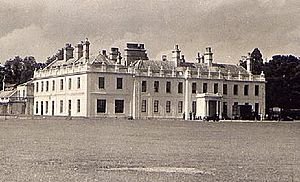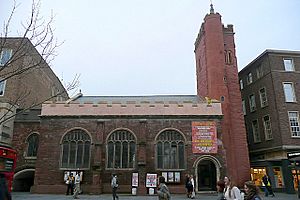Thomas Bampfield facts for kids
Quick facts for kids
Thomas Bampfield
|
|
|---|---|

Poltimore House, the family home
|
|
| Member of Parliament for Exeter |
|
| In office 1654–1660 |
|
| Speaker of the House of Commons | |
| In office April 1659 – April 1659 |
|
| Recorder of Exeter | |
| In office 1654–1660 |
|
| Personal details | |
| Born | c. 1623 Poltimore House |
| Died | 8 October 1693 (aged 70) Exeter |
| Resting place | St Stephen's, Exeter |
| Nationality | English |
| Relations | Sir John Bampfylde (1610-1650) Francis Bampfield (1615-1683) |
| Parents | John Bampfield (1586-1657); Elizabeth Drake (1592-1631) |
| Alma mater | Exeter College, Oxford |
| Occupation | Lawyer and politician |
Thomas Bampfield (born around 1623, died October 8, 1693) was an English lawyer and politician. He served as a Member of Parliament (MP) for Exeter from 1654 to 1660. For a short time in 1659, he was the Speaker of the House of Commons.
Bampfield was part of the Convention Parliament in 1660. This group helped bring back the king, a time known as The Restoration. After 1661, he mostly stopped being active in politics, except for a brief period in 1688. He was a very religious man, a Presbyterian, and later followed a belief called Sabbatarianism. He wrote several religious books. He passed away in October 1693.
Contents
Who Was Thomas Bampfield?
Thomas Bampfield was the eighth son of John Bampfield and Elizabeth. His family, the Bampfields of Poltimore, were important people in Devon. Like many others at the time, Thomas and his brothers supported the Parliament during the Wars of the Three Kingdoms (1638-1651). We don't know if he fought in the wars.
His older brother, Sir John Bampfylde, was also an MP. Another brother, Francis Bampfield, was a Seventh Day Baptist. Francis spent nine years in prison because of his strong religious beliefs.
Thomas Bampfield's Career
Thomas Bampfield studied at Exeter College, Oxford. Then, he trained to be a lawyer at Middle Temple starting in 1642. However, the First English Civil War delayed his training, and he didn't become a qualified lawyer until 1649.
Becoming a Member of Parliament
In 1654, Thomas Bampfield became the Recorder of Exeter. This was an important legal job. Because of this role and his Presbyterianism faith, he was chosen as an MP for Exeter. This was for the First Protectorate Parliament. It's not clear if he actually attended all the meetings. Many MPs, including Bampfield, didn't agree with Oliver Cromwell's rules about how Parliament should work.
In 1656, he was elected again to the Second Protectorate Parliament. He led a special committee that looked into the case of James Nayler, a Quaker activist. Bampfield also spoke out against a law in 1657 called the Militia Bill. This bill would have given more power to military leaders, which many people disliked.
Serving as Speaker of the House
In the Third Protectorate Parliament, Thomas Bampfield served as the Speaker. This means he was in charge of the meetings. He was Speaker from April 14, 1659, until April 22, 1659, when Parliament was closed. He supported bringing back MPs who had been removed from Parliament earlier. He also sat in the Convention Parliament that invited Charles II to become king again.
After King Charles II returned, Bampfield helped write a request asking for mercy for some republican leaders. He also urged the king to marry a Protestant. However, his ideas about religion were not popular at the time. He didn't want the old church system (Episcopacy) to return to the Church of England. He also supported strict rules against drunkenness and bad language.
Later Life and Religious Beliefs
Because his views were different from the public mood, Thomas Bampfield lost his job as Recorder in October 1660. He did not try to become an MP again. His brother Francis, who had been a Royalist, changed his religious views and became a strong supporter of Sabbatarianism. This belief meant that Saturday, not Sunday, was the day of rest.
Thomas Bampfield was against the 1662 Act of Uniformity. This law forced priests to agree to certain religious statements, or they would lose their jobs. Francis was one of those who refused and spent nine years in prison. Later, Thomas himself became a Sabbatarian, convinced by his brother Francis. Francis even started a community of Seventh Day Baptists while in prison.
Thomas Bampfield lost his position as a JP in 1665. But in 1688, he got some of his old jobs back. This happened when the Catholic King James II tried to gain support from Nonconformists (Protestants who were not part of the Church of England). However, after the Glorious Revolution in 1688, Thomas gave up these positions. In his final years, he wrote several books about Sabbatarianism. He died on October 8, 1693, and was buried at St Stephen's Church, Exeter.
Published Works
Thomas Bampfield wrote books about his religious beliefs, including:
- "An Enquiry Whether the Lord Jesus Christ made the World, and be Jehovah, and gave the Moral Law? And Whether the Fourth Command be Repealed or Altered?"
- "A reply to Doctor Wallis"
| Political offices | ||
|---|---|---|
| Preceded by Lislebone Long |
Speaker of the House of Commons 1659 |
Succeeded by William Lenthall |
 | Kyle Baker |
 | Joseph Yoakum |
 | Laura Wheeler Waring |
 | Henry Ossawa Tanner |


